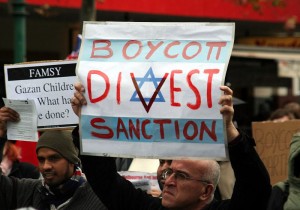My friend at the Jerusalem Center for Public Affairs (JCPA), Dr. Manfred Gerstenfeld, is a wealth of information, especially for people of faith struggling to understand the dynamics in the Arab-Israeli conflict. His book, Demonizing Israel and the Jews, is a hard look at the alarming rise in anti-Semitism worldwide; the book includes essays and interviews with leading experts. In the interview below, Dr. Gerstenfeld explains the startling implications of this form of hatred.
JF: To what era does the current anti-Semitism compare to?
MG: We cannot speak that way because it is different. We are in a period called post. In previous periods, anti-Semitism was always direct. Today’s anti-Semitism isn’t direct. If you say today that the Jews are absolute evil, or Israel is absolute evil, you must say Israeli is committing genocide against the Palestinians. It is very rare to find a Western politician who repeats these things.
The Arab countries in the Middle East have for decades demonized Israel, to Western leadership, which for reasons not entirely clear, listen to them politely. The Bush Administration, for example, was infiltrated by the Muslim Brotherhood years before Obama began mainstreaming them and allowing them to have positions of influence within the White House.
The NGOs in Israel should devote more time to monitoring religious anti-Israel groups, chief among them the so-called “Christian Palestinianists.”
JF: In the Mitchell Bard chapter [Demonizing Israel and the Jews] on the Saudi lobby, we learn of widespread influence there in the U.S. government. Yet we hear mostly about the alleged Jewish lobby.
MG: The issue is, the Arabs have many allies. Among the worst reactionaries in the world. No religion out of which so much murder comes as there is in certain parts of Islam.
Shia phobia or Sunni phobia…we never hear about this. They murder each other!
Arabs and their allies are conducting a total war against Israel. A total war means a war of lies. The PA [Palestinian Authority] promotes lies; lying in Islam is permitted. 
JF: NGOs against Israel. Tell us why they are so problematic.
MG: I believe that there is a long masochistic tradition in Judaism. It already in certain ways starts with Abraham. Abraham asked God to make a maximum effort to prevent the disaster of Sodom and Gomorrah. Yet he makes no effort to save his son after God asks him to sacrifice Isaac. Remarkably different! No fear of confronting God for others. Then the prophets incessantly criticize Israel. In the Talmudic tradition, we find texts that say it’s better to be persecuted than to persecute.
Many NGOs are part of that.
JF: Anti-Israel foes in the Church. How deep is this problem?
MG: I think it is very widespread. We have to separate here the church in its broad sense. We have Catholics, Protestants, Eastern Orthodox churches. The Catholic church is a corporation like a chief executive. A fairly homogenous operation. Today its attitude toward anti-Semitism is much more severe than it’s ever been. The Catholic Church today is much less the problem than the other groups.
Protestants are the more segmented group. Mainline churches—you have problems in the U.S., Europe, the Scottish Church, the Dutch Protestant Church, the state church in Norway. The evangelicals have been pro Israel, but a major effort is to bring them in on the Palestinian side. A huge problem and the problems are rising.
NGO Monitor examines this some, but there is no such monitoring of the churches.
Eastern churches simply often try to please Muslims. Why doesn’t the New York Times report this?
JF: When do you feel media turned against Israel?
MG: It was a gradual process. And it has gotten worse over the years. I think the main development was the 1982 Lebanon War.
Another touchy point: the inability of successive Israeli governments to deal with the propaganda war. Israel has a brilliant instrument in the IDF. We have a cyber-war unit which may become the best unit in the world to fight cyber problems. On the propaganda war…it is a large failure.
Journalists are divided into two groups: those who live by ethics, and those who don’t.
JF: Marvin Heir [dean and founder of the Simon Wiesenthal Center] relates the Chirac story in France. Do you find that most leaders are in denial?
MG: There are a variety of reasons. 1) Not all Western leaders are equal. We have to make a certain separation from naïve Americans and Europeans. These are two different categories. For the Europeans, it affects the image of the “New Europe.” The false image of Europe is that it is peaceful, separate from the past. Now the image of the New Europe is a radically false image. 2) It hinges on oil. Europeans feel they handled the boycott after the Yom Kippur War [1973] very badly. The Arabs need to sell oil; otherwise they cannot live. 3) Emergence of Muslim communities in their own lands. They let in millions of people from a radically different culture and background. The Europeans have to ask themselves if all these people can be integrated. This has led to major problems. And…I do not stereotype all Muslims.
Most extreme acts of anti-Semitism go beyond the acts of anti-Semitism by native Europeans.
JF: Anti-Israelism is the new anti-Semitism, isn’t it?
MG: It is a third generation anti-Semitism. First it was religious in nature. Today, the Jewish state is attacked and that is the new anti-Semitism.
What they have in common is that in all versions, Jews are seen as absolute evil.
JF: Thank you, Manfred Gerstenfeld, for educating us.
MG: My pleasure.

